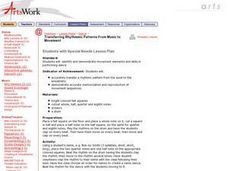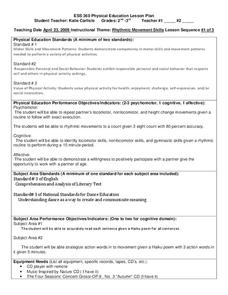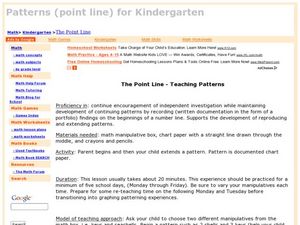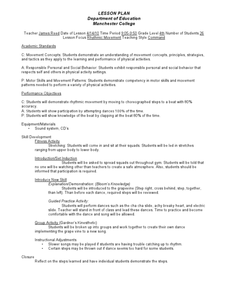Curated OER
Transferring Rhythmic Patterns From Music to Movement
Students identify and demonstrate movement elements in relation to musical notation. They clap to rhythms, beat on drums, match musical notes to speech patterns and use the rhythms of the their names to create a dance.
Curated OER
Rhythmic Pattern and Expressive Movement
Students use the song Row Row Row Your Boat to help them learn patterns and expressive movement. They recreate the movement over and over until it is a pattern and they feel comfortable doing it.
Curated OER
Hispanic Rhythmic Patterns and Drums
Students imitate rhythmic patterns created by the teacher or taken from the drum performance of "Oshossi." They study and perform some of the layered and interlocking rhythms of the drum ensembles of Brazil, Haiti, Cuba, Suriname, and...
Curated OER
Tiles, Blocks, Sapphires & Gold: Designing a Treasure Map
Young cartographers in groups hide treasure at school and then create a map to find it using pattern blocks and tiles. They make paintings with clues to create a visual representation of the location of their treasure. Groups present...
Curated OER
Rhythmic Movement Skills
Young scholars explore rhythmic movements. In this performing arts lesson, students create their own movements and then repeat the each others movement. Finally, young scholars create movements to the Haiku generated by the entire class.
Curated OER
Studio Art Lessons Based on Latin American Arts
Study three of the basic principles of design: l) designs should create a rhythmic pattern made up of related shapes, 2) colors should be repeated so as to not force the eye to remain with a single part of the composition, and 3) a...
Curated OER
The Point Line - Teaching Patterns
Students practice extending patterns. In this patterns lesson plan, students demonstrate extending patterns by performing a rhythmic patter.
Curated OER
Kodaly Beat Lesson
Introduce rhythmic beat and melodic beat with a upbeat activity that asks young musicians to clap the beat to their favorite nursery rhyme. To introduce the rest beat, class members use small drums or other percussion instruments to play...
Curated OER
Rhythm In Motion
Sixth graders work independently and with a partner to demonstrate proficiency of steady beat, meter and basic note values while creating written rhythmic patterns for class performance. State and National Standards are addressed.
Curated OER
Totally Ternary
First graders compose a simple nursery rhyme with percussion and instrumental accompaniment in the general music classroom setting. AB form and rhythmic patterns are emphasized in this 35-40 minute lesson plan.
Curated OER
The Flea's Sneeze Lesson Plan
Students read a book and engage in three different activities. In this lesson about repetitive story patterns, students read a story, The Flea's Sneeze, and examine how the story has a rhythmic pattern of rhyming verse that sounds like a...
Curated OER
Notating a Rainy Day
Young singers learn how to notate the rhythms and melodies of a familiar song using Kodaly hand signals and manipulatives. Individuals then create their own compositions and sing them using Kodaly notation.
Curated OER
Shoes And Singin
Students analyze rhythmic patterns (beat versus no beat), sing an echo song on Solfege syllables, improvise melodies, and express music through creative movement. This activity is written to meet State and National Standards for the Arts.
Curated OER
Crackin' the Musical Code
Students decode musical notation and then synthesize and apply by notating their own musical composition. Students draw various rhythmic examples which are equal in time duration. They notate and count rhythmic patterns. Additional cross...
Curated OER
Salad Sisters
Students practice and perform 8 and 16 beat rhythmic patterns in 4/4 using the song "Salad Sisters" as a basis in this elementary-level General Music lesson. An amazing lesson for teaching cooperative music composition techniques and...
Berklee College of Music
Create Your Own Afro-Latin Groove
The backbone of Latin American music is the beat! Young musicians work on blending Afro-Latin rhythms and beat patterns before incorporating the major pentatonic, minor pentatonic, and blues scales in their own compositions.
Curated OER
Using Garage Band to Enhance 2nd Grade Composition
Your second graders can become composers with a little help from the Garage Band software. You pre-select several drum, piano, and guitar loops for the groups to choose from, then they put them together following an ABA looping pattern....
Curated OER
Rhythm, Math, Rhythm
Young scholars play instruments in math class to learn the interconnectedness between math and music. In this math lesson, students subdivide a piece of music, clapping rhythms and charting rhythm patterns in the song. A guided...
Curated OER
Kye Kye Kule
Third graders study the repeating patterns and basic dance movements used in traditional African drumming songs. In groups, they create a story that can be used with a ritual/tradition and a rhythmic piece that uses repeating rhythmic...
Curated OER
Rhythmic Dancing
Fourth graders practice expressing themselves through the art of dance. In this physical education lesson, 4th graders discuss choreography and how moving specific ways at certain times can be artistic. Students create and...
Curated OER
You've Got Rhythm
Students study the rhythm value of a half note, quarter note, whole note, and eighth note. They stamp a rhythm pattern and create a clay animation which demonstrates note value.
Curated OER
Say It Loud!: A Celebration Of Black Music in America - Lesson 4
Learners choose a theme for a song. They compose a poem, and write music to go along with their poem. The instructor plays the musical accompaniment, and the class votes on the most appropriate rhythmic pattern.
Curated OER
The Rhythm of R & B - Lesson 8
Students describe some of the distinguishing characteristics background rhythms used in R&B. They perform typical R&B accompaniment patterns and develop their own horn section to play background rhythms.
Curated OER
Dinosaur Stomp
Second graders write a dinosaur poem using information from a research activity. In this dinosaur poetry and music lesson, 2nd graders listen to the book Saturday Night at the Dinosaur Stomp in music class. They work in small groups to...























